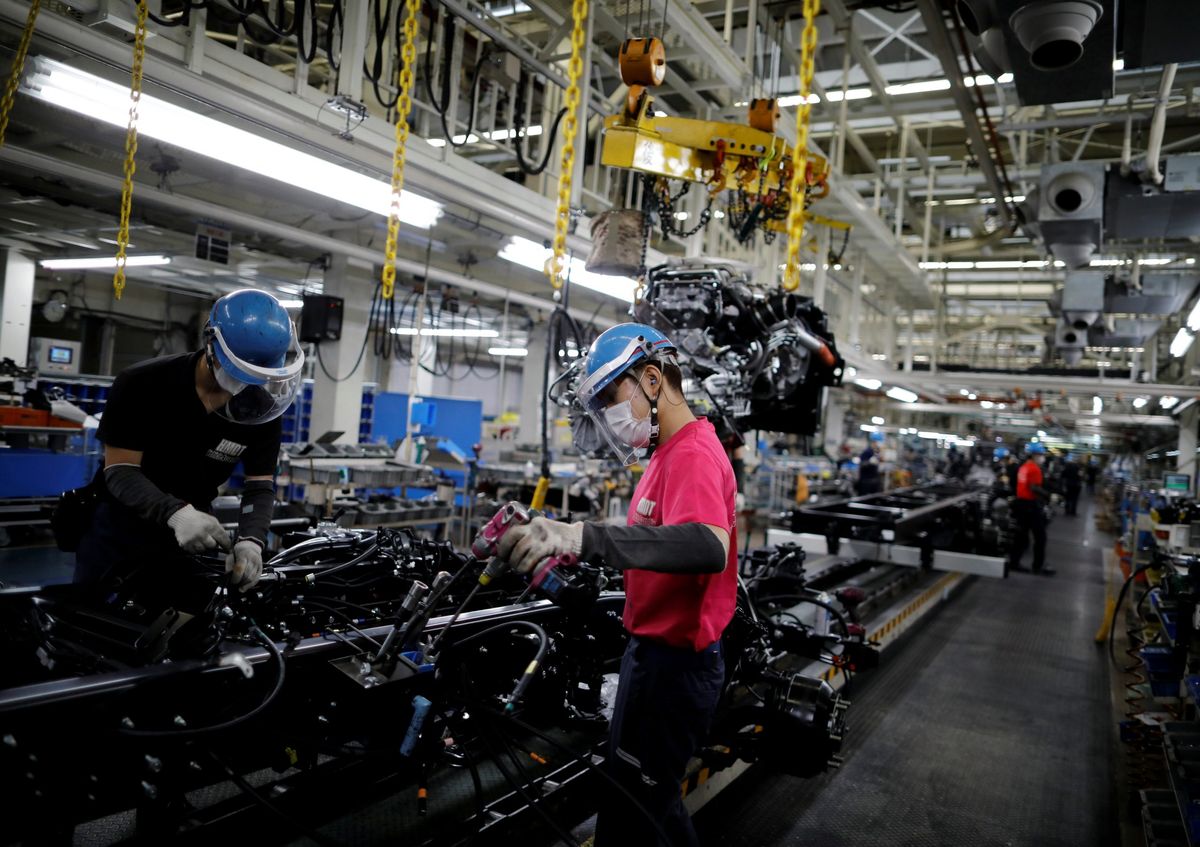Carmakers continue suspending production because of chip shortage. When will it end?

A few minutes every morning is all you need.
Stay up to date on the world's Headlines and Human Stories. It's fun, it's factual, it's fluff-free.
According to Isao Matsumoto, the chief executive officer of a semiconductor company in Japan that supplies chips for Ford Motor Company, Toyota Motor Corp and Honda Motar Co Ltd., the orders are “overwhelming.”
Why is there a chip shortage?
- There are various reasons as to why there is currently a chip shortage.
- During the pandemic, while millions were stuck at home, demand for consumer electronics – from webcams to laptops to PS5 consoles – shot through the roof. On top of that, some chip factories also closed during this period, meaning fewer chips were being produced.
- Another big reason there is a chip shortage is being that there are two main approaches to chip production, using 200 mm or 300 mm sized chips, and the 200 mm one has become way more popular with businesses because it’s cheaper.
- But chip manufacturers haven’t been able to make the 200 mm chips at the rate we’ve needed them. And now, it’s gotten to the point where it’s pretty much impossible to buy a PS5 games console. Apple Inc. has also warned that the shortage may affect iPhone sales.
- Catastrophes like the winter storms in Texas, which has the most semiconductor manufacturing centers in the United States, to a chip factory fire in Japan that halted production, haven’t helped.
- Other factors, such as US-China tensions, have contributed as well. When the United States banned American semiconductor companies from selling chips to Chinese tech giant Huawei, other smaller companies from other parts of the world were flooded with orders.
How is it affecting the car industry?
- It isn’t just self-driving cars that require computer chips. When you consider all of the features in a modern vehicle, like backup cameras, side sensors or a sophisticated hookup for your phone, it makes sense that all of these features require chips.
- That means that the chip shortage has been particularly hard on the global car industry.
- In fact, it has gotten to the point where car makers are removing certain features and functionalities. For example, in some vehicles, French carmaker Peugeot has replaced digital speedometers with analog ones.
- According to Isao Matsumoto, the chief executive officer of a semiconductor company in Japan that supplies chips for Ford Motor Company, Toyota Motor Corp and Honda Motar Co Ltd., the orders are “overwhelming.”
- Matsumoto also said the company is investing more than US$600 million in production capacity, but the equipment is running late and COVID-19 complicates expansion efforts.
What have carmakers said?
- Car companies have suspended production and continuously extended the suspensions because no one really knows how long the shortage will last.
- “Due to the current material shortage situation, triggered by a combination of global semiconductor shortages and new COVID-19 outbreaks, Volvo Cars has decided to pause production in Torslanda for the week of Aug 30-Sep 3," Volvo Cars said in an emailed statement.
- “Production is planned to resume on Sunday, Sep 5." But Volvo had a similar issue only two weeks ago.
- Just two weeks ago, General Motors announced that they were pausing production of the Chevrolet Bolt and Bolt EUV electric vehicles (EVs) for a week at its Michigan plant. Both these models were only announced in February of this year.
- And, Toyota announced around the same time that they were cutting their global production by 40% through September because of the shortage. That’s about 360,000 fewer cars.
- “Due to COVID-19 and unexpected events with our supply chain, Toyota is experiencing additional shortages that will affect production at most of our North American plants. While the situation remains fluid and complex, our manufacturing and supply chain teams have worked diligently to develop countermeasures to minimize the impact on production," said the automaker in a statement.
When will the shortage end?
- The answer isn’t exactly clear cut.
- These chipmakers are racing to meet the demand, investing heavily into things like building facilities to increase production capacity, but these things take a while.
- Seda Memik, a professor of electrical and computer engineering and computer science at Northwestern University said, “It will take multiple years to accomplish … a better balance … Establishing new chip factories is difficult to do quickly. It’s extremely expensive and requires a well-trained workforce."
- Other challenges, though, like COVID-19 outbreaks at plants or climate change related catastrophes causing damage to plants, aren’t predictable nor are they very easy to prevent.
- Dr. Willy Shih, a professor at Harvard Business School, explained in an interview with The Verge that there won’t be a sort of tape-breaking at the finish line, but rather that the shortage will be a problem that will become less severe over time.
- “Well, it’s not going to be like the tape breaks at the finish line, and there’s a clear ending to this thing. Rather, it’s going to be that some sectors are going to get better sooner than others. I think if you’re looking for ‘When are we going to stop talking about it because the problem is not as severe?’ I think it’s going to be the middle of next year,” he said.
Have a tip or story? Get in touch with our reporters at tips@themilsource.com




Comments ()